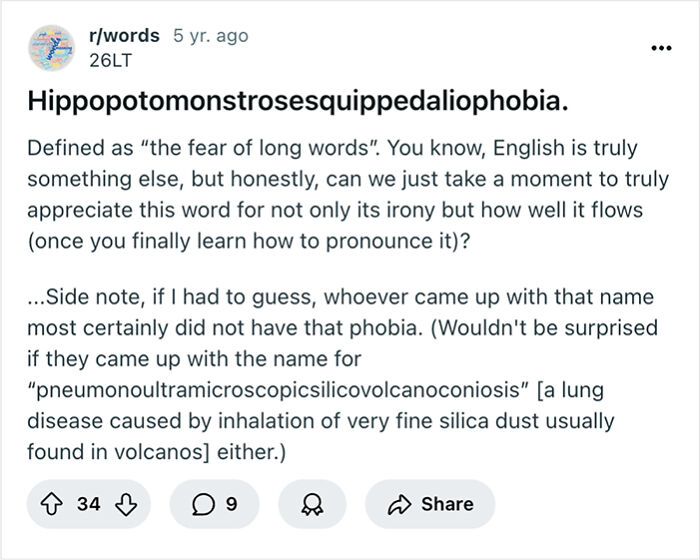The Irony Behind the World’s Cruelest Phobia Name Will Shock You.
However, the word did surface in an episode of Wizards of Waverly Place during a spelling bee.
@saracrumbleleg18#wizardsofwaverlyplace♬ original sound – user3471271791040
It also shows up in the 2023 book The Colossal Book of Incredible Facts For Curious Minds and in Liran Federmann Design’s work, which mentions a spinoff term, “hippopotomonstrosesquippedaliophilia,” meaning a love of long words.
No celebrities have publicly disclosed having the phobia, which might contribute to the stigma.
The Uncomfortable Reality
For people with this phobia, the name may be funny, but the experience isn’t. Verywell Health reports that some individuals shut down entirely when faced with long or even moderately long words. This can interfere with everyday activities like reading, writing, public speaking, or learning.
While long words don’t pose a physical threat, the anxiety they trigger can produce real symptoms: trembling, headaches, sweating. These issues can complicate daily life and highlight how little attention unusual social phobias receive.
Risk factors are overlooked, treatments are limited, and more research is needed into the brain’s response to this fear.
Mental health professionals rarely address fringe phobias, but the Clinical Practice Guideline for PTSD treatment suggests that cognitive behavioral therapy, an exposure-based method, might help people who face tangible anxiety from long words.
There are no peer-reviewed studies on how common this phobia is, which may explain the lack of first-person stories online. Many who have it may not even realize it.
Seeing the Funny Side of Phobia
Some find that humor helps them deal with their fear, while others understandably don’t see it as funny. On Reddit, the Words community has dissected the term multiple times, always out of curiosity, not cruelty. It’s a rare example of comedy that manages to stay kind.
Image credits: r/words
The name of this phobia may be absurd, but it has helped raise awareness. That blend of science and humor is what fascinates people most. The word makes people laugh, but it also forces them to confront a real and under-discussed form of anxiety.
It’s uncertain how much future research will focus on this condition, especially while it remains rare and underreported. But awareness has to start somewhere, and if a laughably long word sparks empathy and interest, it might serve a surprisingly useful role in mental health education.
Total votes ·
Thanks! Check out the results:
Total votes ·
















Post Comment